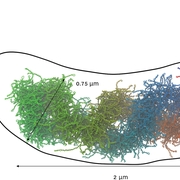


Asli Yildirim, Michael Feig
Nucleic Acids Research (2018), 4, 3937-3952
High-resolution three-dimensional models of Caulobacter crescentus nucleoid structures were generated via a multi-scale modeling protocol. Models were built as a plectonemically supercoiled circular DNA and by incorporating chromosome conformation capture based data to generate an ensemble of base pair resolution models consistent with the experimental data. Significant structural variability was found with different degrees of bending and twisting but with overall similar topologies and shapes that are consistent with C. crescentus cell dimensions. The models allowed a direct mapping of the genomic sequence onto the three-dimensional nucleoid structures. Distinct spatial distributions were found for several genomic elements such as AT-rich sequence elements where nucleoid associated proteins (NAPs) are likely to bind, promoter sites, and some genes with common cellular functions. These findings shed light on the correlation between the spatial organization of the genome and biological functions.